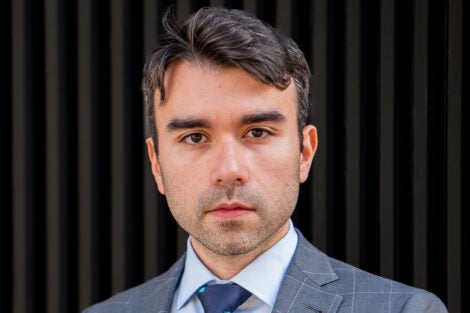June 15, 2023 – Antón Castellanos Usigli, DrPH ’23, is head of New York City-based ACU Innovation and Consulting, a firm that specializes in healthcare strategy, innovation, and evaluation. In his previous role as director of HIV/STI prevention at Wyckoff Hospital in Brooklyn, he started an innovative digital outreach strategy to connect gay and bisexual men to sexual health services through dating apps. Through the multidisciplinary DrPH program at Harvard T.H. Chan School of Public Health and the Cheng Fellowship at Harvard Kennedy School, Castellanos Usigli has expanded his work using dating apps to advance sexual health and well-being.
How did the DrPH program prepare you for your current role?
The leadership track in the first year of the DrPH program was truly life-changing. In the summer of 2019, we did leadership workshops at the Harvard Arboretum in a retreat-like environment. It was challenging and introspective. It was also great doing a practicum that first year, a consulting project with the Boston Public Health Commission. Overall, I loved the interdisciplinary nature of my program, and the ability to craft it to meet my needs and to take classes across other schools at Harvard.
I also loved the emphasis on leadership development. The DrPH executive coaching program offers one-on-one coaching, which has been instrumental in my professional and personal development. I’ve continued to engage with my coach after graduation. And I’ve had incredible mentors who helped me stay focused across my doctoral program.
Your thesis at Harvard Chan School was titled “Swipe right for public health: Can dating apps promote sexual health?” What were the key findings?
My thesis had two components. One was a case study of work that I did as a private consultant with Fenway Health in Boston. I built a replica of the program that I built in New York. We used peer educators to provide sexual health education to gay and bisexual men using dating apps. Again, we had good results. When you look at the demographic breakdown of the men we enrolled in health services, many were immigrants, many were Latino, and many of them lacked access to basic healthcare. We connected them with vital services. We also witnessed a snowball effect: By having these important conversations with people through dating apps, we expanded access to healthcare across their families and communities.
The other part of my thesis involved qualitative interviews with leaders from different sectors: public health, health care, and the dating apps companies. I explored their perspectives on leveraging dating apps as tools for sexual health promotion. I catalogued a deep sense of antagonism between the health spheres and the private dating apps companies and a consequent lack of communication. My thesis captures the very real challenges to successful collaboration while demonstrating why it matters that we work across sectors to connect underserved people with sexual health services.
What is one key public health takeaway that you’d like to share with readers?
I’m a fan of public-private partnerships. People in public health need to stop keeping to our own lanes because when it comes to thinking outside of the box and building innovative strategies, we cannot be siloed, we must work with businesses and we must engage in multi-sectoral partnerships to make real change.
Photo courtesy Antón Castellanos Usigli
